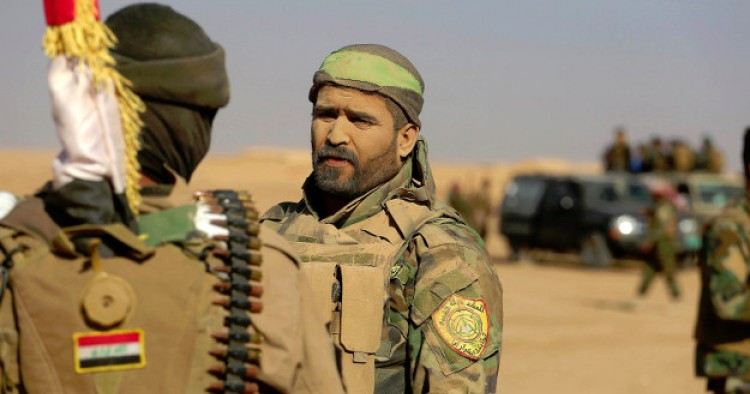Since the 2003 U.S. invasion, Tehran has encouraged and contributed to the formation of countless Shiite militia groups in Iraq. While most of these armed groups are now formally organized under the umbrella of the Popular Mobilization Forces (P.M.F.), they have in reality remained independent entities and are not controlled by the civilian government in Baghdad.
But has Tehran committed a strategic blunder by fracturing the Iraqi Shiite armed groups or does the existence of competing Shiite Iraqi militias benefit the Islamic Republic?
Colonel Joel Rayburn, now a senior director for Iran, Iraq, Syria and Lebanon at the National Security Council, discusses the former viewpoint in Iraq After America: Strongmen, Sectarians, Resistance. He argues that Major General Qassem Soleimani, the head of Islamic Revolutionary Guards Corps Quds Force (I.R.G.C.-Q.F.), “had armed and trained as many Shia factions as possible” to empower his Iraqi proxies to fight and expel the United States from Iraq. But in doing so, Rayburn argues, Iran “had given those factions the means to make war upon each other, ruining the Shia political unity that was the core of Iran’s longer-term strategy to ensure that the new Iraqi order would be Shia-dominated and friendly to Iran.” Rayburn concludes: “In retrospect, giving the Iraqi parties arms without being able to control the direction in which they were aimed was a colossal blunder by Soleimani and his deputies…”
But what if Tehran’s support to multiple Shiite militias is not a blunder, but is a calculated risk and a part of Iran’s strategy for Iraq?
There is no doubt that the fragmentation of Iraqi Shiites made the Iraqi state vulnerable to the threat from the Islamic State three years ago, but it has also allowed Tehran to maintain its influence over Iraqi politics and security. Shiite Iraqi militias constantly compete with each other for Tehran’s favor rather than follow orders from Baghdad. This in turn makes Iran’s Soleimani a central player in Iraqi politics.
The divide-and-rule strategy appears to be working for the Quds Force as Iraqi militia chiefs openly declare their subordination to Tehran. On April 5, for example, Abu Mahdi al-Muhandis, P.M.F.’s operational chief commander, told the Iranian Students’ News Agency: “I’m honored to be Haj Qassem [Soleimani]’s soldier!”
Hadi al-Amiri, the head of the Badr Organization, had told Iran’s Kayhan newspaper two years ago that he considered Ayatollah Ali Khamenei, Iran’s Supreme Leader, his “source of emulation.” Amiri shows his devotion to Khamenei by kissing the Ayatollah’s hand during official visits to Iran. Likewise, Seyyed Mohammad Tabatabaei, the deputy head of Iranian-backed Asaib Ahl al-Haq, had threatened to “target any American on Iraqi soil with the exception of the U.S. embassy staff.”
This shows that the splintering of and rivalry between Iraqi Shiites may not necessarily be detrimental to Iranian agenda in neighboring Iraq. Rather than a blunder limiting Tehran’s options, a lack of unity between Iraqi Shiites provides the Islamic Republic with better opportunities to shape Iraqi politics.
The Middle East Institute (MEI) is an independent, non-partisan, non-for-profit, educational organization. It does not engage in advocacy and its scholars’ opinions are their own. MEI welcomes financial donations, but retains sole editorial control over its work and its publications reflect only the authors’ views. For a listing of MEI donors, please click here.













